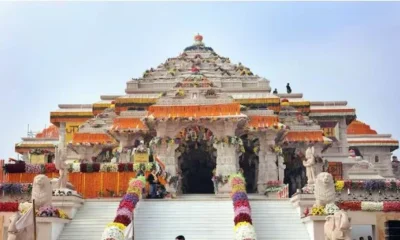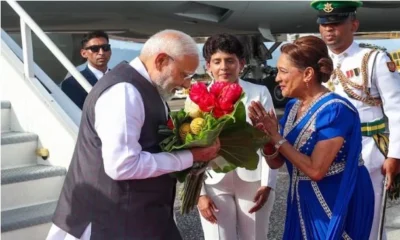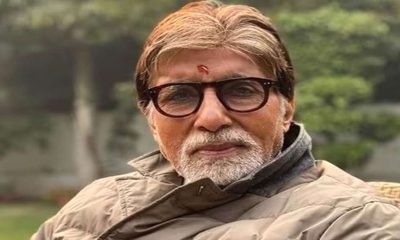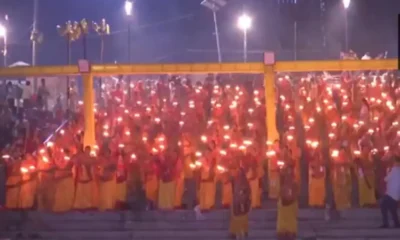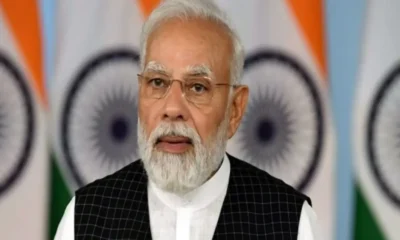As the Ram-Janmabhoomi-Babri Masjid title dispute reaches its last leg this week, Ayodhya has been placed under Sec 144 till 10th December 2019. Earlier this month, the deadline of arguments was moved up to 17th October, instead of the previously fixed 18th October. CJI Ranjan Gogoi has on a prior occasion remarked, “It will be miraculous if we deliver the judgement in four weeks in the matter.” The Chief Justice intends to deliver verdict before his retirement, which is due on 17th November.
Below is a detailed timeline of the dispute since its inception:
1528: Babri Masjid built by Mir Baqi, commander of Mughal emperor Babur.
1885: Mahant Raghubir Das files plea in Faizabad district court seeking permission to build a canopy outside the disputed Ram Janmabhoomi-Babri Masjid structure. Court rejects plea.
December 1949: Idols of Ram Lalla placed under a central dome outside the disputed structure.
1950: Gopal Simla Visharad files suit in Faizabad district court for rights to worship the idols of Ram Lalla.
1950: Paramahansa Ramachandra Das files suit for continuation of worship and keeping the idols.
1959: Nirmohi Akhara files suit seeking possession of the site.
1981: UP Sunni Central Waqf Board files suit for possession of the site.
February 1, 1986: Local court orders the government to open the site for Hindu worshippers.
August 14, 1989: Allahabad HC ordered maintenance of status quo in respect of the disputed structure.
December 6, 1992: Ram Janmabhoomi-Babri Masjid structure demolished.
1993
April 3: ‘Acquisition of Certain Area at Ayodhya Act’ passed for acquisition of land by Centre in the disputed area.
1993: Various writ petitions, including one by Ismail Faruqui, filed at Allahabad HC challenging various aspects of the Act.
October 24, 1994: SC says in the historic Ismail Faruqui case that a mosque was not integral to Islam.
April 2002: HC begins hearing on determining who owns the disputed site.
2003
March 13: SC says, in the Aslam alias Bhure case, no religious activity of any nature be allowed at the acquired land.
March 14: SC says interim order passed should be operative till the disposal of civil suits in Allahabad HC to maintain communal harmony.
2010
September 30, 2010: HC, in a 2:1 majority, rules three-way division of disputed area between Sunni Waqf Board, the Nirmohi Akhara and Ram Lalla.
May 9, 2011: SC stays HC verdict on Ayodhya land dispute.
February 26, 2016: Subramanian Swamy files plea in SC seeking construction of Ram Temple at the disputed site.
2017
March 21: CJI JS Khehar suggests out-of-court settlement among rival parties.
August 7: SC constitutes three-judge bench to hear pleas challenging the 1994 verdict of the Allahabad HC.
August 8: UP Shia Central Waqf Board tells SC mosque could be built in a Muslim-dominated area at a reasonable distance from the disputed site.
September 11: SC directs Chief Justice of the Allahabad HC to nominate two additional district judges within ten days as observers to deal with the upkeep of the disputed site.
November 20: UP Shia Central Waqf Board tells SC temple can be built in Ayodhya and mosque in Lucknow.
December 1: Thirty-two civil rights activists file plea challenging the 2010 verdict of the Allahabad HC.
December 5: The final hearings in the Ayodhya appeals begin before a Bench of Chief Justice of India (now retired) Dipak Misra, Justices Ashok Bhushan and S. Abdul Nazeer.
2018
February 8, 2018: SC starts hearing the civil appeals.
March 14: SC rejects all interim pleas, including Swamy’s, seeking to intervene as parties in the case.
April 6: Rajeev Dhavan files plea in SC to refer the issue of reconsideration of the observations in its 1994 judgement to a larger bench.
July 6: UP government tells SC some Muslim groups were trying to delay the hearing by seeking reconsideration of an observation in the 1994 verdict.
July 20: SC reserves verdict.
September 27: SC declines to refer the case to a five-judge Constitution bench. Case to be heard by a newly constituted three-judge bench on October 29.
October 29: A three-judge Bench led by CJI Ranjan Gogoi order the dispute appeals will be listed in January 2019 before an appropriate Bench to fix a date for hearing.
2019
January 4: A Two-judge CJI Bench again says an “appropriate Bench” will take up the appeals on January 10.
January 8: SC notifies that a five-judge Bench led by the CJI and the next four future Chief Justices of India in line of seniority – Justices S.A. Bobde, N.V. Ramana, U.U. Lalit and D.Y. Chandrachud – will hear the Ayodhya title dispute appeals on January 10.
January 10: The hearing remains a non-starter as Justice U.U. Lalit recuses himself from the Bench.
January 29: Hearing deferred as Justice Bobde was on medical leave. Justices Ashok Bhushan and S. Abdul Nazeer are replaced with Justices N.V. Ramana and U.U. Lalit.
February 20: A Supreme Court circular informs that the Ayodhya Bench will assemble on February 26.
February 26: The Supreme Court proposes a court-monitored mediation process between the Hindu and Muslim parties litigating the Ayodhya dispute. Gives eight weeks for the Muslim appellants to examine the official translation of Ayodhya case records.
March 8: The Bench sends the Ayodhya dispute for mediation. The mediators are former apex court judge, Justice F.M.I. Kalifulla, as Chairman, spiritual leader Sri Sri Ravishankar and senior advocate Sriram Panchu.
August 2: Efforts to mediate a final settlement between rival Hindu and Muslim parties in the Ayodhya title dispute cases, a Constitution Bench led by Chief Justice of India Ranjan Gogoi says; Court decides to hear appeals from August 6 on a day-to-day basis.
August 6: Constitution Bench begins hearing the cross-appeals filed by the Hindu and Muslim sides challenging the three-way partition of the disputed 2.77 acres of Ramjanmabhoomi-Babri Masjid land among Ram Lalla, Nirmohi Akhara and the Sunni Waqf Board; Nirmohi Akhara lays claim to Ram Janmabhoomi
August 7: “Whether Jesus Christ was born in Bethlehem… Has such a question ever arisen in any court,” Justice S.A. Bobde asks; Unshakeable faith is proof of Rama’s birthplace, says Ram Lalla‘s lawyer.
August 8: Can birthplace be considered a ‘juristic person’, asks Supreme Court.
August 9: Senior advocate Rajeev Dhavan, appearing for a Muslim party, said he will “not be able to assist” the court if the hearing is “rushed through”.
August 13: We’re in no hurry to finish Ayodhya hearing, says Supreme Court.
August 14: Supreme Court poses queries to Hindu parties’ counsel on who ordered temple’s demolition, Babur or much later, Aurangzeb. Hindu Party states, demolition doesn’t matter as long as consistent travelogues document the existence of a temple, people’s association of a certain divinity to the place, and later continued faith in its ruins.
August 16: Prove that Babri Masjid was built over a temple, Supreme Court tells Hindu parties.
August 20: Inscription on mosque slab spoke of Vishnu temple, Hindu party informs Supreme Court.
August 21: Present evidence on temple claim, Supreme Court tells lawyers.
August 22: Hindus have an “unfettered” right to worship at a site believed for centuries to be the birthplace of Lord Ram, appellant Gopal Singh Visharad tells court.
August 23: Respond to Ayodhya case judge’s protection plea, Supreme Court tells U.P. government. Nirmohi Akhara quizzed by court on rights to Ayodhya site.
August 27: Nirmohi Akhara drops objection to a separate suit for title filed by the Ayodhya deity.
August 28: Babur may not have built Babri Masjid, Supreme Court told.
August 30: Emperor Babur was an invader and law could not be used to ‘institutionalise’ the rights of an invader, the Hindu Mahasabha argues; Shia Waqf Board questions claim of Sunni section over the disputed land.
September 3: Installation of idols inside Babri Masjid in the intervening night of December 22-23 of 1949, which marked the beginning of heightened tensions and legal battle, was a “surreptitious attack”, senior advocate Rajeev Dhavan claims. SC notice to Chennai man for allegedly intimidating Rajeev Dhavan
September 4: Hindus and Muslims “alike used to worship in the mosque-temple”, Rajeev Dhavan tells Supreme Court. SC to look into litigant’s complaint of intimidation.
September 6: CJI to hear plea for live-streaming of Ayodhya title dispute case
September 14: A devotee’s faith cannot be questioned, says Supreme Court
September 16: Ayodhya parties want mediation talks to resume, mediation panel informs Supreme Court
September 17: Hindu parties’ arguments based on theology rather than legality and concrete proof, says counsel for Muslim parties, Rajeev Dhavan
September 18: Ram Chabutra becomes the focal point in Ayodhya hearing. Supreme Court allows mediation committee to resume talks
September 20: Court decides to sit for an extra hour daily to heed to the October 18 deadline
September 23: Court rises at 5pm instead of 4 pm, as decided last week.
September 25: Muslim parties contest infirmity of report of Archaeological Survey of India; Court says can’t contest now, when issue was not raised in High Court
September 26: Justice Bobde mentioned the experts (ASI) have inferred. Archaeology is an inexact science. “The ASI cannot be considered authoritative,” Justice Bobde remarked, at which Ms. Arora immediately responded: “If that’s so, I rest my case!”
September 30: ‘Ram Lalla’ counsel CS Vaidyanathan informs court of unwillingness to take part in fresh mediation; said they want a court verdict
October 4: Deadline for wrapping up arguments revised to 17th October
October 14: Administration has imposed Sec 144 of CrPC in Ayodhya, operative till 10th December. Muslim parties to conclude arguments today
November 17, 2019: CJI retires. Court verdict on Ayodhya issue expected to come anytime in mid November.


 India News17 hours ago
India News17 hours ago
 Latest world news16 hours ago
Latest world news16 hours ago
 Latest world news2 hours ago
Latest world news2 hours ago
 Latest world news2 hours ago
Latest world news2 hours ago
 India News2 hours ago
India News2 hours ago
 Latest world news2 hours ago
Latest world news2 hours ago
 India News1 hour ago
India News1 hour ago
